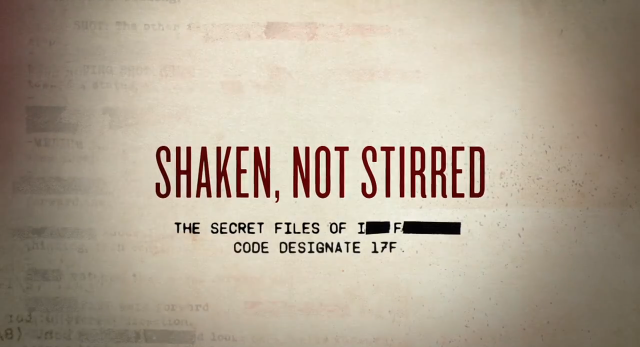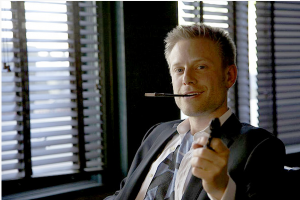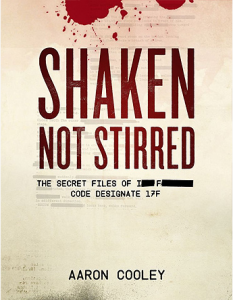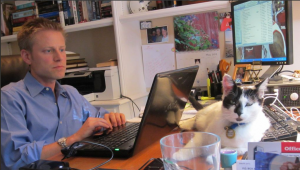
by Jenna | Nov 20, 2013 | Writing Articles
I've had three experiences lately that have triggered performance anxiety for me. Two assignments, where I've delivered a project to someone else, and one where I'm sharing my work with other people in a public forum. Now you might think I'd be over that by now, given that I'm writing publicly every week, teaching classes, and coaching on the spot all the time. I'm in a constant practice of "performing" or being in the spotlight.
But the truth is, that whenever we venture into new territory, our fears and doubts about our ability to "deliver" can come cropping up fairly quickly. I've observed that performance anxiety tends to come up as a result of three things:
- We're trying something new.
- We're holding high expectations about the quality of the work we "should" be delivering.
- Other people are holding high expectations about our work as well (or we believe they are).
Performance anxiety tends to trigger an inner conversation (if we're even conscious of it, which we might not be) that goes something like this: "What if I let them down? What if it's not as good as they expect? What if I can't live up to their expectations? What if I can't live up to my own expectations?"
And that conversation in turn tends to leads to paralysis, perfectionism, and procrastination -- the three Ps of writing doom.
What's your mindset?
As I was noticing this behavior in myself as well as the inner conversation about it, I was reminded of Carol Dweck's book on Mindset* that I've been reading lately.
In it, she describes interesting scenarios under which people demonstrate either a fixed or growth mindset. The sports examples particularly resonated for me.
In one example, she talked about how John McEnroe, a tennis player famous for his on-court temper tantrums, illustrated the fixed mindset perfectly. The minute anything would go wrong with his game, he was full of excuses about distractions, noises, other people, etc. It was never his fault and never his responsibility. This is very common among people who perceive themselves as talented or have the belief that other people see them as talented.
In other words, because we are so talented, we believe we shouldn't have to work at it.
On the other hand, she also described Michael Jordon, and how after his basketball comeback, when they lost the big game of the season, he went back to the gym that night and worked on his game. He knew that he'd been resting on his laurels, thinking he could just drop back into the game after time away, and he was determined to change that -- through hard work and dedication to raising the bar on his skill set.
And that's the difference, that right there. The belief that talent and ability are fixed versus the belief that a skill set can be mastered and improved.
Strategies for dealing with performance anxiety
I've worked with two teachers lately who have really brought this home for me: Hal Croasmun of ScreenwritingU.com and Corey Mandell, both screenwriting instructors. Hal reminds me to have a "beginner's mind" and to learn to be comfortable with the discomfort of growth. Corey reminds me to focus on what I'm learning, not on where I'm failing.
Ideas for dealing with performance anxiety:
- Make growth mindset choices rather than fixed mindset choices. Keep working, learning, and growing. You'll only get better.
- As Hal says, be comfortable with the discomfort of growth and be willing to allow yourself to be a beginner.
- As Corey suggests, keep your focus on what you're learning, not on how you haven't yet mastered the new skill you're attempting to integrate.
- Shift your self-talk by first recognizing that fear and doubt are coming up and helping yourself through it. "Okay, I'm worried about what other people think. What if I just let that go and focus on doing the best work I'm capable of right now, and allow myself to learn as I go?"
- Give yourself permission to fully engage in the messy, glorious process of learning and revel in it.
- Reward yourself for your efforts.
- Have lots of support from your peers.
- Be authentic about what you're experiencing with yourself and with your peers. You'll all benefit from it.
- Find ways to create accountability for yourself so that you do the work, even in the face of creative anxiety.
- Create a little extra time and space around the learning to help ease up on the pressure.
What works for you?
I'd love to hear your thoughts in the comments.
Warmly,

p.s. I haven't forgotten that I promised last week to write more about creative identity -- and I will, soon! Stay tuned. :)
You may also be interested in:
* Affiliate link

by Jenna | Nov 13, 2013 | Writing Articles
Last week I met with a group of 13 moms to talk about "Designing Your Writing Life as a Mom". I was struck by the disconnect many of the mothers were experiencing around their creative identity, which is something many writers struggle with, parents or not.
Observations about creative identity
Here's what I noticed about creative identity through talking with these moms and working with writers through my writing community. And certainly the question of creative identity is not specific to writers, either, it translates across all forms of creative expression.
- When you aren't owning your creative identity, you can feel out of step with yourself, like you neither belong here nor there. This is about not being in touch with a sense of thinking of yourself as a "writer" or an "artist" yet -- or ever. (Some people don't like labels of any kind, but that's not quite what we're talking about here.) It's about having a deep sense of inner rightness connected to how you think of your answer to the question, "Who am I?"
- Coming to terms with your identity as an artist or writer can require dealing with old expectations and limiting beliefs about what it means to be creative. Sometimes, I find that these thoughts and beliefs revolve around negative perceptions of creativity as flaky and ungrounded. Sometimes this can also mean letting go of expectations -- and previous self-incarnations -- of wild and prolific creativity, especially when faced with Real Life challenges (like parenting, care giving, careers, and day jobs).
- As a culture we tend to diminish or devalue writing and creativity, so sometimes we resist calling ourselves by those identities. We're afraid to be laughed at or seen as not being serious by our peers in "real" jobs.
- As a culture we tend to also exalt creative expression only for certain types of artists or writers (usually "talented" or "successful" in a certain way), and we feel ashamed to try to claim our creative identity "too soon." I see this a lot in the debate about when we can consider ourselves "real" writers. Do we have to be published first? Do we have to be paid first? Many writers, including me, feel that if we're writing regularly we can call ourselves writers. I see this showing up when people say, "I am a struggling writer" or "I am a wannabe writer."
- Going through a major life transition can challenge your creative identity, like motherhood, major loss, career change, or divorce. I imagine this challenge could come in a good sense -- helping us more fully claim our identities -- or in more challenging one, where we lose all sense of ourselves and can't seem to find our way back. Often this comes about when we make a transition from one career to another (even if it's from one creative career to another). When I became a coach and left my urban design work behind, it took a long time to feel like a coach. When I became a writer as well as a coach, it took another solid chunk of time to transition into seeing myself as a writer.
Identity challenges coming out of an MFA program
One thing that also struck me when I listened to the mothers the other day was about how many of them had been through MFA programs and then into motherhood and now weren't writing. I suspect there are a few components to that process. In the first place, an MFA program can be an extremely intense phase of writing time -- even binge-writing -- which can be quite exhausting and requires time to recover from. I can still remember how finishing graduate school myself felt like hitting a brick wall -- intense action followed by a sudden, total full stop that left me adrift, much in the way a rushing river spilling out into a lake or ocean suddenly loses its force.
There's also a major shift in community. One writer I interviewed about going through an MFA program said, "There is a sense of loss in leaving an MFA program. You're surrounded by people who really care about writing, and then when you leave, you need to find a way to get continued support for your writing, and it's not easy."
On top of that, while an MFA program can be about becoming a writer in a very real sense, the focus is primarily on craft, and not so much on developing a consistent writing practice. My interviewee commented, "When I graduated, it was like I reentered the 'real world' and realized that, while I'd no doubt become a better writer, I hadn't developed consistent, sustainable writing habits, which was about learning a whole new skill." So it's easy to imagine that writers coming out of an intense program might suddenly feel at a loss about how to continue -- and even start to wonder who they are as their entire foundation changes.
Next time we'll talk more about how to reclaim your identity as an artist or writer if you've lost it or you're struggling to claim it.
You may also be interested in:

by Jenna | Nov 6, 2013 | Writing Articles
If you're a parent, having a regular writing routine takes on an additional layer of complexity -- especially in the early years. It's hard enough to handle being a parent (and even more so if you're ALSO highly sensitive or introverted as many writers are), and if you've got a career on top of it, it's easy to let writing take a back seat to the more pressing day-to-day demands.
The funny thing is that in some ways it's EASIER to design your writing life as a parent because it requires quite deliberate attention and focus, or it simply won't happen at all.
Many writers -- parents or not -- tend to dream of having long, uninterrupted blocks of time to write. What's fascinating to me about this dream is that 1) it often stops people from writing if they DON'T have it, and 2) it often stops people from writing if they DO have it.
For those you fondly cherishing the dream of long stretches of time to write you might be thinking, "What the heck is she talking about?"
But here's the thing. What we see quite consistently in the writing community is that writers who aren't writing regularly don't tend to benefit from having MORE time to write. If anything, they just tend to go into greater paralysis and procrastination.
Why on earth would something like this happen?
We've talked about this a lot here, but it's worth saying again. (And again.) Fear is why writing doesn't happen.
Big blocks of time simply INCREASE the pressure on writing. Which increases the fear. Which increases the resistance and procrastination. Entire days and weeks can go by and no writing happens.
Looking for big blocks of time is one of the fastest ways into paralysis I've seen.
So, writers, and particularly parent writers, let's just give up that fantasy for now, shall we? At least until your writing habit is so firmly ensconced in your daily routine that expanding your time won't send you into fits of terror. Or procrastination. (On a side note, that still happens even with the most experienced of writers, so don't worry too much if it crops up. Just find a way to get back to the writing as quickly as possible.)
The bottom line for all writers -- and particularly for parents -- is that creating some kind of routine around your writing is key. Reduce the variables, reduce the amount of time available, and create parameters around your writing so that it HAS TO GET DONE at a certain time or it won't get done at all.
The reason that this is easier for parents, in my opinion, is that it is actually TRUE. It isn't fabricated quite as artificially for non-parents. For writers who aren't parents, it's easier to tell ourselves we'll just write before bed or after work or some other random opportunity that comes along but often gets swallowed up by television or internet browsing. For parents, there's a cold hard reality that stares us right in the face. Those kids are coming home at a certain time and the chances of pulling off any kind of writing after that point in time are slim to none unless we have some kind of pre-arranged plan with our spouses or co-parents to make it happen.
For non-parent writers, particularly those entrepreneurial types who work from home (like me, pre-kid), it's SO MUCH HARDER to find something to "bump up against" in your schedule because so often your time is entirely self-directed. This is part of why we run so many writing sprints for my writing community -- it provides a scheduled opportunity to write for an hour that's both fixed in time and fun to participate in.
On the other hand, the challenges for parents can be trickier too. Honestly, I didn't even know what busy was until I had a child. I really thought I did. Truly! I was so wrong. Being a parent takes so much of my attention bandwidth and energy, I have to be exceedingly deliberate now about making time and energy available for writing too, in such a way that it doesn't feel like I'm taking it overly away from my son or from my work. A dicey balance to say the least.
Here are a few tips for parents -- that ultimately translate for all writers -- into a designing a writing life that works:
- Get clear about the assumptions you're making about writing. What are you telling yourself about what you need to write that might be getting in your way of actually doing the work? (See also my article about "Buts" here.)
- Get clear about WHY you want to write. What's important to you about it? For me, it has a lot to do with my identity that's totally separate from my role as a mother, and I firmly believe is part of what keeps me sane.
- Make a decision that writing for SOME amount of time is better than NO amount of time. Let go of the idea that writing for long blocks of time is the only way to do it. If you target 15 minutes a day, you can accomplish a tremendous amount of writing over time if you show up and do it consistently.
- Get out your calendar and take a both ruthless and creative approach to carving out the time to write. Think about when the kids are occupied or when you can talk your spouse into watching them for you. Give yourself the gift of protected, uninterrupted writing time, even if it's just for a few minutes a day.
- Be aware that IF you have any kind of resistance to writing or tendencies to procrastinate (this is most of us!) it's easiest to write first thing in the morning before you have time to think about it or talk yourself out of it. For a few months I tried writing every day after I dropped my son off at preschool but found that because it felt like "work time" I had a hard time focusing on writing. So I started getting up at 6 a.m. to write everyday -- and knew that I had to be done by 7 a.m. when my husband would leave for work -- so I had to get it done then. It changed my life. (See my articles about writing early in the morning here and here.)
You may also be interested in:

by Jenna | Oct 30, 2013 | Writing Articles
One of my all time favorite quotes about writing comes from Steven Pressfield, author of what has become my bible for writing, The War of Art*. In it, he says:
"There's a secret that real writers know that wannabe writers don't, and the secret is this: It's not the writing part that's hard. What's hard is sitting down to write. What keeps us from sitting down is Resistance."
As a writing habit and motivation coach, I work with writers all over the world who face and tackle this resistance every single day as they struggle to sit down to write. Very often that resistance takes the form of the word "But".
- But I don't have enough time.
- But I don't have enough training.
- But I don't know what to write.
- But I'm not inspired.
- But I'm not a good enough writer.
- But I'm not in the right mood.
- But I need to take care of all these other tasks first.
- But I'm not making enough money yet to justify taking time to write.
- But I don't have a laptop.
- But I'm tired, I didn't get enough sleep last night.
- But I'm too busy.
- But my day job takes up too much of my time.
- But I don't have a private space.
- But my kids will interrupt me.
- But my mom might call and need me.
- But I'm bored with this project.
- But I can't decide which project to start with.
- But I'm stuck.
- But I have writer's block.
- But if I was a real writer, it would come easily to me.
- But I have to deal with this crisis/emergency/major life issue first.
Guess what?
All these Buts are just stories. They are coming up for a deeper reason.
The deeper reason is fear.
Fear is what truly stops us from writing. The Buts are just the surface level rationalizations for fear. They are convenient excuses to keep your butt out of your chair and doing other things so you don't have to face the discomfort of taking on your dream.
Pressfield also says:
"Never forget: This very moment, we can change our lives. There never was a moment, and never will be, when we are without the power to alter our destiny. This second, we can turn the tables on Resistance. This second, we can sit down and do our work."
It turns out that actually DOING the writing is fairly easy. Most of the writers I work with find that once they are actually putting words on the page, they forget about the inner struggle and just do the work. In my writing community we run five weekly group writing sprints to help our writers overcome the resistance to sitting down to write (and to curtail the sense of isolation). My other favorite trick is to write first thing in the morning with a timer running. Pushing the start button gives me a "GO" that gets me into gear even when the Buts are loud and pernicious.
The thing to notice here is that fear is a beacon. It guides you exactly where you need to and even want to go, though you may not be aware of that wanting yet. The thing is, if it wasn't a big, big dream, you wouldn't be afraid of it.
No, I'm not talking here about naturally protective fear that keeps you safe from lions, tigers, and bears -- that's GOOD fear -- I'm talking about the kind of fear that's a holdover from when you were a kid, the kind that's trying to keep you safe from any kind of personal humiliation or risk. This is also the kind of fear that's keeping you "safe" from achieving your dreams.
I didn't quite mean for this to become an ode to Steven Pressfield, but he has so much genius on this subject I can't help sharing a few more of my favorite quotes from him about fear:
"Fear is good. Like self-doubt, fear is indicator. Fear tells us what we have to do. Remember our rule of thumb: The more scared we are of a work or calling, the more sure we can be that we have to do it."
And:
"Figure out what scares you the most and do that first."
So it's time.
It's time to stop listening to the Buts, the fears, the doubts, and the rationalizations. It's time to site down and do the work, to coax yourself through the fear with lots of support and promises of rewards, to feed your own well of creative inspiration so you feel consistently nourished and ready to write, and to learn whatever you need to learn so you feel equipped to do the writing. But above all else, it's time to write.
You may also be interested in:

by Jenna | Oct 16, 2013 | Writing Articles
 I had the pleasure of meeting Aaron Cooley earlier this year in Los Angeles and I was instantly intrigued by his story of not only how he came to write his first novel, Shaken, Not Stirred*, but also how he went about publishing and promoting it. So much so that I've invited him here to talk about it with us today.
I had the pleasure of meeting Aaron Cooley earlier this year in Los Angeles and I was instantly intrigued by his story of not only how he came to write his first novel, Shaken, Not Stirred*, but also how he went about publishing and promoting it. So much so that I've invited him here to talk about it with us today.
Aaron is a both a screenwriter and novelist and works in film development for Joel Schumacher Productions. His knowledge of the film industry has influenced his approach to his novel, as you'll discover, and given him a leg up in creating a pretty bad-ass book trailer. He's shared some real gems of wisdom all writers can benefit from, including tips on e-publishing, what to write, and how to reach your audience.
Enjoy!

Aaron, thank you so much for being here with us. Would you start off by telling us what inspired you to write your book "Shaken, Not Stirred" and a little bit about what it's about?
 Well, I didn't intend to write a book at all. I've been working in Hollywood in film development and doing some screenwriting on the side for over ten years now. In 2007, while researching a movie I had been hired to rewrite, I came across a little blurb about a World War II-era Yugoslavian spy named Dusko Popov who Ian Fleming had met and upon whom he had probably based aspects of James Bond. (I now know there are dozens of people who have claimed to be his inspiration.) I thought this would make a fantastic buddy spy action film, so I started pitching it around town. What I found was that although no one had explored my particular Popov take on the story, there were already at least 3 or 4 "Young Ian Fleming" projects in development -- one of which finally got made for television starring Dominic Cooper and comes out next year. So I put it on the shelf. Two years later, I still couldn't get the idea out of my head and as I started to notice how popular and successful e-books had suddenly become -- I think Wool had just sold to Ridley Scott -- I decided to take a crack at it. I always dreamed of being a fantasy novelist when I was a kid and this was my chance to see if I could actually write a book start to finish.
Well, I didn't intend to write a book at all. I've been working in Hollywood in film development and doing some screenwriting on the side for over ten years now. In 2007, while researching a movie I had been hired to rewrite, I came across a little blurb about a World War II-era Yugoslavian spy named Dusko Popov who Ian Fleming had met and upon whom he had probably based aspects of James Bond. (I now know there are dozens of people who have claimed to be his inspiration.) I thought this would make a fantastic buddy spy action film, so I started pitching it around town. What I found was that although no one had explored my particular Popov take on the story, there were already at least 3 or 4 "Young Ian Fleming" projects in development -- one of which finally got made for television starring Dominic Cooper and comes out next year. So I put it on the shelf. Two years later, I still couldn't get the idea out of my head and as I started to notice how popular and successful e-books had suddenly become -- I think Wool had just sold to Ridley Scott -- I decided to take a crack at it. I always dreamed of being a fantasy novelist when I was a kid and this was my chance to see if I could actually write a book start to finish.
I think the world of e-books is an exciting way for struggling screenwriters to get their work out there; screenwriting can feel like a very unrewarding career in which no one's reading your stuff, and nothing's getting made. Even many of the highest-paid names in the business feel this frustration. I've had three separate paid writing gigs that were read by probably about 20 people combined because those producers had money, but not the connections to do anything with the scripts. Whereas my book's being read by thousands of people I've never met. That's the real dream of a writer, isn't it?
It seems like you had a well-thought-out strategy for how and when you launched the book. Can you give us some insight into how you executed the launch and how it went? Is there anything you'd do differently in hindsight?
We tried to do this big movie-type build-up to the launch that started weeks in advance. The main thing I would do differently is to get the book on sale as quickly as possible, much earlier in the process. Because Amazon only allows "big" publishers to do pre-sales, I will always wonder how many people saw my trailer or started following me on Twitter in May or June or July of 2012, discovered they couldn't buy the book yet, then completely forgot about it. I do think the main thing we did well was tie my book into the opening weekend of SKYFALL -- there were a lot more people searching online for Bond stuff in the weeks leading up to that, and a lot of online bloggers and journalists came out of the woodwork asking to interview me because they wanted to write something about 007 but didn't have access to the Broccolis or Daniel Craig. I think that helped with the great sales results I had in the first couple weeks.
Would you speak to your choice to publish an e-book only, versus going for a printed version or a combination of the two? Would you consider offering a printed version through something like Amazon's CreateSpace or Lulu.com or do you draw the line with an e-book, and if so, why?
It's funny you ask -- the paperback of Shaken, Not Stirred is finally going on sale starting Black Friday, mainly so my mom can use it as a stocking stuffer for Christmas. We started with an e-book-only release because when e-books exploded, it seemed like this thrilling, completely new medium -- like when people first started posting things on YouTube -- and that's what I was initially drawn to and wanted to be a part of. But I started to wonder if I might have made a mistake at last year's Thanksgiving. I'm from a huge family and celebrate Thanksgiving with 70+ people. Last year, it was 3 weeks after the e-book had been published, and all my older aunts and uncles and even cousins my age and younger were coming up to me and complaining that they couldn't read my book because they didn't have an e-reader. But when my 92-year-old Grandpa Harold cornered me about it, I knew I better do something about it. Since then, I've just been waiting for the right time. The next Bond movie is way too far away (2015!), so Christmas 2013 it is.
Tell us about your writing habit. When do you write and how do you stay motivated? Do you ever find yourself procrastinating or resisting writing, and if so, how do you get yourself back in action?
 I have a full-time job -- but I actually think that's a good thing for writers. I can only devote two hours a day to writing, but if that's the only time you have, you really have to be focused in those two hours and it makes you more productive. I think if I had 8 hours I'd still only get 2 or 3 productive hours in each day. I actually set an alarm and turn off email and social media until that alarm goes off. The hardest time to motivate is when you don't know what your next project is, and you have to spend that 2 hours brainstorming and going through old idea docs and banging your head against your walls. I've spent weeks outlining an idea and reading thousands of pages of research on it only to realize, "This isn't the one." When you're supposed to be writing something, you know it. But make sure you pitch it to a couple people early on. To this day, my 3 or 4 best-received scripts (and the novel) are things that I pitched to people early on and kept getting, "Wow, that's awesome, you've got to write that," as a response.
I have a full-time job -- but I actually think that's a good thing for writers. I can only devote two hours a day to writing, but if that's the only time you have, you really have to be focused in those two hours and it makes you more productive. I think if I had 8 hours I'd still only get 2 or 3 productive hours in each day. I actually set an alarm and turn off email and social media until that alarm goes off. The hardest time to motivate is when you don't know what your next project is, and you have to spend that 2 hours brainstorming and going through old idea docs and banging your head against your walls. I've spent weeks outlining an idea and reading thousands of pages of research on it only to realize, "This isn't the one." When you're supposed to be writing something, you know it. But make sure you pitch it to a couple people early on. To this day, my 3 or 4 best-received scripts (and the novel) are things that I pitched to people early on and kept getting, "Wow, that's awesome, you've got to write that," as a response.
Is there a particular strategy or method you use to approach a writing project, in terms of story development? Was it different with the book than with a screenplay?
I'm from the movie business, so I still always start with the three-act structure. Even my book has a classic three-act structure -- but I think it's perfect for it, since it's supposed to read like a prototype Bond movie. A lot of screenwriting books go into even greater detail about this structure; my favorite is Blake Snyder's Save The Cat*. There have been articles just this summer specifically ripping this book saying that movies are now too married to this structure. I have found my tastes drifting more and more to TV, so I can't argue with that. But it's good to have a map to get your story started early on in the process. I always try to put my story in Blake's structure beat sheet very early on, just because it gives me ideas for scenes I really need to get my characters from A to B. But then I throw that beat sheet away and never look at it again. Screenwriting rules are meant to be broken.
And ultimately it's all about the characters. I still use a worksheet of 30 character questions that my college screenwriting professor Marc Lapadula gave our class in 1997. It's detailed questions you should ask of all your main characters, from their relationship with their parents to how many sexual partners they've had and who they were. Characters are always the most important thing, and I think they're becoming more important again as people gravitate toward shows like BREAKING BAD. For the book, I filled out all 30 questions for my two male leads and Christine, the femme fatale. As I'm filling these out, almost every answer sends me right back to my story outline to add a scene or even just a line of dialogue based on what I now know about the characters' backgrounds.
You made a very cool trailer for Shaken, Not Stirred. Can you tell us about how you created it? Is it something you made yourself? What do you think it takes to make a high quality book trailer that really works?
Look, I had some obvious advantages working in this business. We shot the trailer on the Fox lot. My cinematographer has been our 2nd Unit DP (Director of Photography) on some of my boss's movies, and shot that submarine movie that came out earlier this year, PHANTOM. My editor gets paid a ton of money to direct and edit commercials, so he really knew how to make it the perfect pace and length. My composer apprentices under a living legend, Hans Zimmer. It was my idea, I wrote it and "directed" it, but these guys are pros who do this everyday and they made me look good. An author in Iowa unfortunately may not have the same resources and a weak trailer can potentially hurt you more than not having one at all. I think the main things that work about mine are that it's short and that there's no "acting" in it. I think unless you have real pros acting for a talented director, you're really rolling the dice on how professional the acting will come off. The best book trailers I've seen are quick, to the point, and don't have actors.
Do you have any tips about e-publishing you think writers should know about?
- Don't wait, do it yourself, and do it now. The chances of getting an agent or publisher when you're first starting out are so slim these days -- there are just too many writers out there. So prove you can do it, and they'll come find you when the time is right.
- Write something only you can write. If you write something because you're sure it will sell, that probably means 25 other people out there are writing it simultaneously, and half of them are better connected than you. Write something that no one else is smart or crazy enough to write.
- Find a friend who maybe is interested in marketing or publicity and partner with them -- offer them a percentage of your profits to do everything they can to get your book out there. My book release was definitely a team effort.
- Think about who your audience is, and really go after them. If you've written a dystopian YA novel, you've got to find a way on Twitter and Facebook and Instagram and GoodReads to get your book in front of Hunger Games fans. I was able to do that with the Bond audience, but now I'm scared as hell about how I'd do it if I write a totally unrelated book!
- Don't worry about making money. If you publish exclusively on Amazon, they offer you a certain number of days during which you can sell your book for free. Do it! This will get your book in the hands of so many people who never would have bought it, even for 3 or 4 bucks. I will be doing this on future books. Amazon sold 20 times the copies Barnes & Noble sold of my book, literally 20 times. As a Portlander who grew up going to Powell's, it pains me to say it, but Amazon rules the universe now. So I wouldn't hesitate about just going exclusively Amazon on the next one.
Is there anything else you'd like to tell us?
I think my Blazers might have a playoff team this year.
:) Thanks, Aaron!
About Aaron Cooley:
 A former child actor, Aaron Cooley has been living on film sets since the age of three. Upon graduating from Yale, Aaron migrated to Los Angeles, where he has apprenticed under director Joel Schumacher, most recently serving as his head of development and Associate Producer. As a screenwriter, Aaron has developed projects for the companies behind PULP FICTION, TRANSFORMERS, ROCKY, SAW, and THE BREAK-UP, as well as helped create advertising for various MTV Awards Shows and public service campaigns. SHAKEN, NOT STIRRED is Aaron’s first novel.
A former child actor, Aaron Cooley has been living on film sets since the age of three. Upon graduating from Yale, Aaron migrated to Los Angeles, where he has apprenticed under director Joel Schumacher, most recently serving as his head of development and Associate Producer. As a screenwriter, Aaron has developed projects for the companies behind PULP FICTION, TRANSFORMERS, ROCKY, SAW, and THE BREAK-UP, as well as helped create advertising for various MTV Awards Shows and public service campaigns. SHAKEN, NOT STIRRED is Aaron’s first novel.
You can find Aaron on Twitter here: https://twitter.com/fleming17f, where he tweets about all things Bond plus intriguing TV and screenwriting topics. Or "Like" his Facebook page at www.facebook.com/shakennotstirredbook for updates on the upcoming paperback release and his future writing projects.
Find
Shaken, Not Stirred on Amazon
here*.
Thanks for reading!
As always, we love to hear your thoughts in the comments.
Warmly,

* Affiliate link

by Jenna | Oct 9, 2013 | Writing Articles
 Today's article is a guest post by story and Enneagram expert Jeff Lyons of StoryGeeks.com. His article touches on a often overlooked aspect of story development that many writers miss and their story structure suffers as a result: their main character's "moral problem".
Today's article is a guest post by story and Enneagram expert Jeff Lyons of StoryGeeks.com. His article touches on a often overlooked aspect of story development that many writers miss and their story structure suffers as a result: their main character's "moral problem".
Jeff will be teaching us more about how to identify a character's moral problem in his upcoming workshop here in Berkeley, California (I'm co-hosting) on October 26 and 27 on his method of Rapid Story Development. We'd love to have you join us if you'd like to learn more.
Now here's Jeff's article:

The problem is moral
Hands down, the most important and most overlooked story structure element all writers either miss altogether or bungle is the moral problem. This pesky problem is not just a nice perk -- it is a make-it-or-break-it story structure component of any good story.
The moral problem is the hole in the heart of your protagonist. He or she starts off the story in some pickle, some predicament of their own making, ideally brought about by the very moral problem to which they are oblivious. This problem is making them act badly in the world. They are hurting people emotionally, mentally, and maybe even physically due to this lack. It’s the hurting of others that make it a moral issue, and not just a psychological one (the distinction is about hurting others versus hurting oneself). The character needs to learn some lesson about how to live in the world so that they no longer hurt others; some lesson that elevates them (hopefully, but not always) to be a better person. They learn that life lesson that makes them moral again.
Good stories have protagonists with this hole in their heart. And the best stories rip out the protagonist’s heart and then somehow heal it again, before the heart gets put back inside (I’m speaking metaphorically, of course -- unless this is a Clive Barker horror story).
How to find the moral problem
So, the question becomes: how does a writer figure out how to find one of these heart-holes? How do you assure that your protagonist has a meaningful moral problem and an equally meaningful growth-moment at the end of the story where they see the error of their evil ways? Some writers have a natural gift for this and flawed and tortured protagonists come to them as gracefully as flight to an eagle. For others (i.e., most of us) the process of finding a good moral problem is more like trying to find a taxi on a rainy night.
The good news, however, is that there is a tool that any writer can use to help them crack this problem, regardless of their natural gifts. That tool is called the Enneagram. The Enneagram is a powerful archetypal system that describes the nine core personality drives underlying all human behavior. Each of the nine drives is rooted in thoughts, feelings and actions that largely determine how we interact with the world, for good or ill. Everyone has an Enneagram type -- including fictional characters and stories themselves. Writers have used this tool for many decades to develop multi-dimensional characters, but it can also be used as a story development too, when coupled with story structure principles. It is this relationship between the Enneagram and story structure that gives writers a doorway to finding the most dramatically powerful moral problem for their protagonist.
What's your character's poison?
Let’s take an example and walk through the problem as a point of illustration:
You just wrote the movie The Verdict. Frank, the protagonist, is a ambulance-chasing, alcoholic lawyer who is constantly looking for the next sucker to scam into hiring him. You know he’s a drunk. You know he’s in pain. But what’s his moral problem? Is his alcoholism the moral problem? Alcohol hurts lots of people. Is his pain the moral problem? If so, what’s the pain? How do you figure out which it is? Writers spend lots of time caught up in this maze of questions and confusion.
Enneagram to the rescue. Each of the nine Enneagram personality styles has something called a "poison". This poison is the hole in the heart. It is the thing that poisons everything they do, everything they feel, everything they think. So, what’s poisoning Frank? Certainly alcohol is, but that’s mostly just hurting him. It’s not hurting other people. What he’s doing that’s hurting others is that he is using them. He sees people as targets, not people. So, we have the answer, right? He’s using people. That’s the moral problem, right? No, not quite. That’s what he’s doing; that’s not why he’s doing it. The moral problem is the motivation, the thing causing the using.
The Enneagram poison can help you quickly answer this question and find the real moral problem. Of the nine personality styles, the 3rd style ("The Achiever") is the one who has the poison of secretly feeling that they have no personal worth or value. This fits Frank’s actions to a tee. For him, people have no value; they’re things to be used. He ultimately feels this because deep down he believes he has no value or worth himself and therefore no one else has value either. Over the course of the movie he learns that, indeed, not only do people matter, but that he himself matters and he can make a difference in the world.
And so not only does the Enneagram technique of looking for the poison explain the motivation behind the protagonist's immoral behavior, it also points to the final self-revelation at the end of the story, where the hero or heroine realizes how to heal the hole in their heart. In this case, Frank realizes he has value and so do other people. He is able to make a new choice as a result.
Moral problem and story structure
As a writer, having this key piece of information -- a clear moral problem -- is critical for you to not only address your main character's development and arc, but also to guide you on how best to structure your story so that key story beats, like the inciting incident, low point, and final climax, are all driven by the engine of the protagonist's moral problem.
This is a deep subject, but a critical one for any writer. The moral problem can make or break your story, and the Enneagram can help you rapidly navigate the difficult questions that might otherwise hang you up and drag out the development process.
If you'd like to learn more, join us in Berkeley on October 26 & 27. Early registration ends TOMORROW, Thursday, October 10. Find more and register here: http://RapidStoryDevelopment.com
Your turn
As always, we love to hear your thoughts in the comments.
Warmly,

You may also be interested in:
Thanks for reading.







 I had the pleasure of meeting Aaron Cooley earlier this year in Los Angeles and I was instantly intrigued by his story of not only how he came to write his first novel,
I had the pleasure of meeting Aaron Cooley earlier this year in Los Angeles and I was instantly intrigued by his story of not only how he came to write his first novel,  Well, I didn't intend to write a book at all. I've been working in Hollywood in film development and doing some screenwriting on the side for over ten years now. In 2007, while researching a movie I had been hired to rewrite, I came across a little blurb about a World War II-era Yugoslavian spy named Dusko Popov who Ian Fleming had met and upon whom he had probably based aspects of James Bond. (I now know there are dozens of people who have claimed to be his inspiration.) I thought this would make a fantastic buddy spy action film, so I started pitching it around town. What I found was that although no one had explored my particular Popov take on the story, there were already at least 3 or 4 "Young Ian Fleming" projects in development -- one of which finally got made for television starring Dominic Cooper and comes out next year. So I put it on the shelf. Two years later, I still couldn't get the idea out of my head and as I started to notice how popular and successful e-books had suddenly become -- I think Wool had just sold to Ridley Scott -- I decided to take a crack at it. I always dreamed of being a fantasy novelist when I was a kid and this was my chance to see if I could actually write a book start to finish.
Well, I didn't intend to write a book at all. I've been working in Hollywood in film development and doing some screenwriting on the side for over ten years now. In 2007, while researching a movie I had been hired to rewrite, I came across a little blurb about a World War II-era Yugoslavian spy named Dusko Popov who Ian Fleming had met and upon whom he had probably based aspects of James Bond. (I now know there are dozens of people who have claimed to be his inspiration.) I thought this would make a fantastic buddy spy action film, so I started pitching it around town. What I found was that although no one had explored my particular Popov take on the story, there were already at least 3 or 4 "Young Ian Fleming" projects in development -- one of which finally got made for television starring Dominic Cooper and comes out next year. So I put it on the shelf. Two years later, I still couldn't get the idea out of my head and as I started to notice how popular and successful e-books had suddenly become -- I think Wool had just sold to Ridley Scott -- I decided to take a crack at it. I always dreamed of being a fantasy novelist when I was a kid and this was my chance to see if I could actually write a book start to finish. I have a full-time job -- but I actually think that's a good thing for writers. I can only devote two hours a day to writing, but if that's the only time you have, you really have to be focused in those two hours and it makes you more productive. I think if I had 8 hours I'd still only get 2 or 3 productive hours in each day. I actually set an alarm and turn off email and social media until that alarm goes off. The hardest time to motivate is when you don't know what your next project is, and you have to spend that 2 hours brainstorming and going through old idea docs and banging your head against your walls. I've spent weeks outlining an idea and reading thousands of pages of research on it only to realize, "This isn't the one." When you're supposed to be writing something, you know it. But make sure you pitch it to a couple people early on. To this day, my 3 or 4 best-received scripts (and the novel) are things that I pitched to people early on and kept getting, "Wow, that's awesome, you've got to write that," as a response.
I have a full-time job -- but I actually think that's a good thing for writers. I can only devote two hours a day to writing, but if that's the only time you have, you really have to be focused in those two hours and it makes you more productive. I think if I had 8 hours I'd still only get 2 or 3 productive hours in each day. I actually set an alarm and turn off email and social media until that alarm goes off. The hardest time to motivate is when you don't know what your next project is, and you have to spend that 2 hours brainstorming and going through old idea docs and banging your head against your walls. I've spent weeks outlining an idea and reading thousands of pages of research on it only to realize, "This isn't the one." When you're supposed to be writing something, you know it. But make sure you pitch it to a couple people early on. To this day, my 3 or 4 best-received scripts (and the novel) are things that I pitched to people early on and kept getting, "Wow, that's awesome, you've got to write that," as a response. A former child actor, Aaron Cooley has been living on film sets since the age of three. Upon graduating from Yale, Aaron migrated to Los Angeles, where he has apprenticed under director Joel Schumacher, most recently serving as his head of development and Associate Producer. As a screenwriter, Aaron has developed projects for the companies behind PULP FICTION, TRANSFORMERS, ROCKY, SAW, and THE BREAK-UP, as well as helped create advertising for various MTV Awards Shows and public service campaigns. SHAKEN, NOT STIRRED is Aaron’s first novel.
A former child actor, Aaron Cooley has been living on film sets since the age of three. Upon graduating from Yale, Aaron migrated to Los Angeles, where he has apprenticed under director Joel Schumacher, most recently serving as his head of development and Associate Producer. As a screenwriter, Aaron has developed projects for the companies behind PULP FICTION, TRANSFORMERS, ROCKY, SAW, and THE BREAK-UP, as well as helped create advertising for various MTV Awards Shows and public service campaigns. SHAKEN, NOT STIRRED is Aaron’s first novel.
 Today's article is a guest post by story and Enneagram expert Jeff Lyons of StoryGeeks.com. His article touches on a often overlooked aspect of story development that many writers miss and their story structure suffers as a result: their main character's "moral problem".
Today's article is a guest post by story and Enneagram expert Jeff Lyons of StoryGeeks.com. His article touches on a often overlooked aspect of story development that many writers miss and their story structure suffers as a result: their main character's "moral problem".